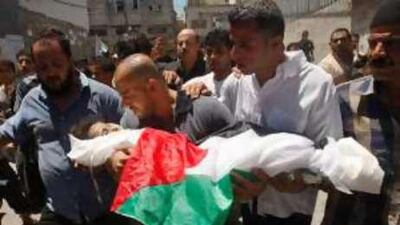RAMALLAH, WEST BANK // More than 100 people were arrested yesterday after six people were killed and 19 wounded in an explosion near a crowded beach just south of Gaza City. It was probably the worst conflagration of internal Palestinian tensions since Hamas routed Fatah-affiliated security forces in the Gaza Strip in June 2007.
Of the six killed in Friday evening's blast, five were senior members of Hamas's armed wing, the Izzedin al Qassam Brigades and the sixth was Sireen al Safadi, a five-year-old girl. Hamas wasted little time in accusing elements from within its main rival, Fatah, of involvement, then rounded up 100 Fatah members for questioning within hours of the blast. "The Fatah movement is behind this reprehensible crime," a senior Hamas leader, Khalil al Haya, told a crowd of thousands at the victims' funeral in Gaza yesterday. "Those who carried out this crime are making war on Islam, on the security of Gaza and on the resistance," he said.
For its part, Fatah denied responsibility and a statement from the group said the blast was part of an internal conflict within Hamas's armed wing. The Hamas members killed were identified as Iyad al Aya, Amir al Sabeh, Nidal Moubeihed, Oussama Alhelo and Hassan al Helou. "The Fatah movement has no link whatsoever with these internal disputes within Hamas," the statement by Fatah said. "The claim that Fatah carried out these explosions aims to cover up the fact that there are disputes within Hamas."
But Ahmed Yousef, a senior adviser to the Hamas foreign ministry in Gaza, struck a more cautious note regarding blame for the explosion. "It's too early to say who is really behind this blast," Mr Yousef said. "We believe that there may be rogue elements from Fatah involved, guns for hire." Mr Yousef suggested that a possible motivation for the blast was to undermine one of Hamas's central achievements in Gaza since it took full control of the area a year ago, which was to improve the internal security situation.
Since Hamas seized control of Gaza, there has been little internal fighting and a spate of kidnappings of foreigners came to an abrupt end. "In the last 15 years, Gazans have never enjoyed the kind of security we have now," Mr Yousef said. "Hamas is very proud of having created this climate of security, and [those behind this incident] want to prove otherwise." But in an interview conducted at a safe location in Gaza 10 days ago, Amir al Sharif, head of the Aqsa Martyrs' Brigades, a militant group affiliated with Fatah, accused Hamas of acting in the interests of Israel by targeting Fatah. He said the Islamist movement was betraying the Palestinian cause in favour of a pan-Muslim, Iranian-supported agenda.
"Hamas was created with the help of Israel to counter the PLO," said Mr Sharif, who is sought by Hamas and lives in hiding. "It now acts in the interests of its Iranian sponsors against the Palestinian cause." Mr Sharif saw little hope in reconciliation efforts to bridge the de facto split in the Palestinian polity unless Hamas either agreed or was forced to relinquish its control over Gaza. Mr Sharif's rhetoric is indicative of the lingering anger among the Fatah rank-and-file at Hamas and the difficulty leaders of both factions have in overcoming suspicions of each other to reach what all sides have publicly called the priority of national unity.
A speech by Mahmoud Abbas, the Palestinian president, at the beginning of June in which he said Fatah and Hamas should enter into unconditional talks aimed at reconciliation in line with a March Yemeni initiative was hailed as the start of a process to unite the Palestinian polity. But little has since happened. "I don't think there will be [reconciliation] talks until the end of the year," said Ali Jarbawi, a political analyst.
"I think Abu Mazen [Mr Abbas] wants to let negotiations with Israel run their course and will not risk US displeasure by talking to Hamas. Hamas is not serious, since it believes Abu Mazen will not deliver anything by the end of the years, so it has no motivation to reconcile." Mr Jarbawi said the blast in Gaza could be attributed to Israel as Fatah or internal Hamas fighting. The fact, however, that neither side blamed Israel, showed that both factions were so consumed by their own factional rivalry that they would rather point the finger at each other before implicating Israel.
"It's very depressing that Palestinian politics has reached such a low that, while under occupation, Palestinian factions are fighting each other, or accusing each other, before Israel." Mr Yousef said the blast had come at a time when Hamas was expecting an Egyptian invitation for both Fatah and Hamas to conduct reconciliation talks in Cairo. Although the blast might delay the process, he said, he remained hopeful that reconciliation was still possible.
"It depends on how the situation develops, if it is contained or escalates. We will see in the next 24 hours." @Email:okarmi@thenational.ae

